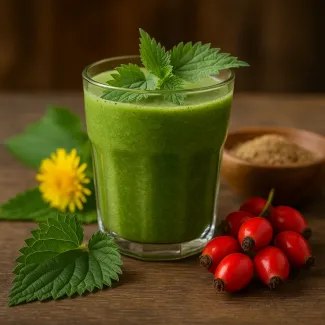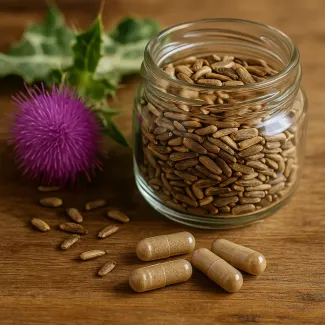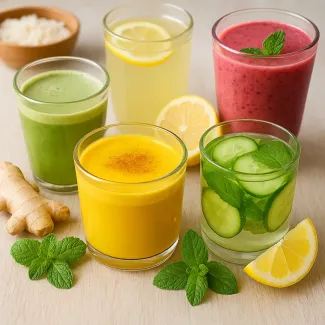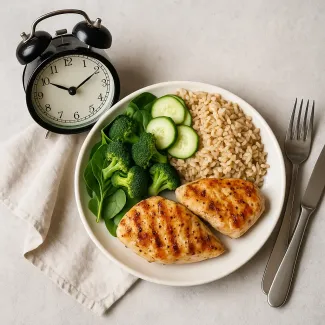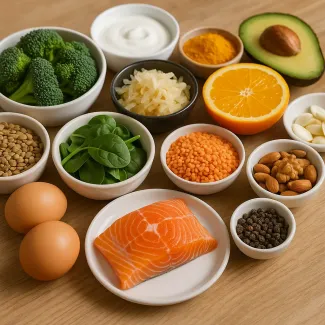
Unlocking Your Body’s Potential to Absorb More from What You Eat
Practical strategies to support digestive efficiency and nutrient uptake
The hidden importance of nutrient bioavailability
When we talk about a healthy diet, most people focus on what they eat—greens, proteins, healthy fats—but far fewer pay attention to how well their body absorbs those nutrients. This is where the concept of nutrient bioavailability becomes critical. Bioavailability refers to the degree and rate at which nutrients are absorbed into the bloodstream and made available to the body for use.
You can eat all the right foods and still suffer from nutrient deficiencies if your body isn’t absorbing them properly. Factors such as digestive health, food combinations, meal timing, gut microbiome balance, and even stress levels can significantly affect absorption. Enhancing the way your body processes and utilizes nutrients isn’t just about better digestion—it’s a foundational strategy for improving energy levels, skin health, immune function, and mental clarity.
Why some nutrients are harder to absorb
Not all nutrients are equally absorbable. Fat-soluble vitamins (A, D, E, K) need dietary fats to be digested efficiently, while minerals like iron and calcium often compete for absorption in the intestines. Plant-based sources of nutrients, though valuable, may come with anti-nutrients such as phytic acid or oxalates, which inhibit mineral uptake.
The complexity doesn’t end there—individual genetics, gut enzyme activity, and the state of the intestinal lining can further influence how nutrients are processed. That’s why optimizing absorption goes far beyond merely consuming a "balanced diet".
The role of digestive health in nutrient absorption
Your digestive system is the front line in nutrient absorption. From the moment food enters your mouth, your body starts to break it down, chemically and mechanically. However, when the gut is inflamed, overly acidic, or compromised by dysbiosis, nutrient extraction becomes inefficient.
To improve your gut environment, focus on foods that nurture digestive health: fermented foods like kefir, sauerkraut, and yogurt promote microbial diversity, while prebiotic fibers from onions, garlic, leeks, and bananas support beneficial bacteria. Adequate hydration, chewing thoroughly, and managing stress all contribute to better digestion, making nutrients more available for absorption.
Food synergy: pairings that improve bioavailability
Sometimes, it's not just what you eat but what you eat it with. Certain food combinations dramatically improve how nutrients are absorbed. For example:
- Vitamin C boosts the absorption of non-heme iron from plant foods. A spinach salad with lemon juice or red peppers is far more effective than spinach alone.
- Healthy fats enhance the uptake of fat-soluble vitamins. Drizzling olive oil over steamed vegetables or pairing avocado with salsa can make those nutrients more accessible.
- Black pepper, particularly the compound piperine, increases the bioavailability of curcumin (the active ingredient in turmeric) by up to 2,000%.
Learning how to maximize food synergy in your meals is one of the most effective ways to support nutrient absorption naturally.
Intermittent fasting and meal timing
Meal timing also plays a role in nutrient absorption. Some evidence suggests that intermittent fasting protocols, such as time-restricted eating, can improve insulin sensitivity, reduce inflammation, and support the gut lining. This, in turn, enhances how nutrients are metabolized and absorbed.
Spacing meals adequately—allowing for at least 4–5 hours between meals—can also improve digestion and reduce gut inflammation. Avoiding frequent snacking gives the migrating motor complex (a cleansing wave in the intestines) time to function properly, which is essential for maintaining intestinal health.
Supporting the gut lining and villi function
The small intestine’s surface is lined with tiny finger-like projections called villi, which increase the area available for nutrient absorption. Damage to these structures—due to chronic inflammation, gluten sensitivity, or infections—can lead to malabsorption.
Nutrients like glutamine, zinc, and vitamin A are critical for the maintenance and repair of the gut lining. Bone broth, shellfish, pumpkin, and eggs are excellent dietary sources. Also, avoiding irritants like alcohol, refined sugars, and processed foods helps maintain villi integrity.
Gut microbiome and its influence on nutrient uptake
The microbiome plays a surprisingly important role in determining how efficiently nutrients are absorbed. Beneficial microbes produce enzymes and acids that help break down food particles and extract nutrients. For instance, certain bacteria synthesize vitamin K2 and short-chain fatty acids, both of which have systemic health benefits.
A diet rich in plant diversity, fermented foods, and prebiotics promotes a healthier microbiome, which in turn facilitates improved nutrient metabolism, especially B vitamins, magnesium, and iron. Taking care of your gut flora is not a fringe concern—it’s a cornerstone of nutrient optimization.
Enzymes and stomach acid: underrated factors
Adequate levels of digestive enzymes and stomach acid (HCl) are essential for breaking down food into absorbable components. As we age or experience chronic stress, stomach acid production often declines, leading to protein malabsorption and bloating.
Incorporating bitter foods (like arugula, endives, dandelion greens) and apple cider vinegar before meals may help naturally stimulate stomach acid. For some individuals, digestive enzyme supplementation may be beneficial, particularly if consuming high-protein or complex meals.
How stress blocks nutrient absorption
Chronic stress doesn't just affect mood—it profoundly impacts digestion. Under stress, the body enters “fight or flight” mode, suppressing digestive function in favor of survival responses. This slows down enzyme secretion, reduces gut motility, and impairs blood flow to the digestive organs.
Mindfulness techniques, deep breathing before meals, eating slowly, and avoiding screens during eating can shift the nervous system into a relaxed state—which is vital for effective digestion and nutrient absorption.
The impact of inflammation and food intolerances
Systemic or localized inflammation in the gut can hinder absorption by damaging epithelial cells and altering permeability (commonly referred to as leaky gut). This can result in nutrient leakage and immune reactions.
Common triggers include gluten, dairy, processed foods, and food coloring. An elimination diet followed by reintroduction can help identify culprits. Reducing inflammation improves not only gut function but restores nutrient uptake capacity, particularly for zinc, magnesium, and essential fatty acids.
Supplements that enhance nutrient absorption
While food should always be the first source of nutrition, certain supplements can support or enhance bioavailability when used strategically. For example:
- Liposomal vitamins have higher absorption rates due to their phospholipid encapsulation.
- Chelated minerals (e.g., magnesium glycinate) are often better absorbed than their inorganic counterparts.
- Probiotics can reestablish microbial balance, aiding digestion and micronutrient synthesis.
- Digestive bitters and ox bile may support fat digestion, particularly for those with gallbladder issues.
Supplements should always be chosen carefully and tailored to individual needs, preferably guided by testing or a health practitioner.
Environmental toxins and nutrient blocking
Heavy metals like lead, cadmium, and mercury can disrupt nutrient transporters and damage mitochondria, reducing the efficiency of nutrient use inside cells. These toxins are often found in contaminated fish, old plumbing, or industrial pollution.
Cilantro, chlorella, and spirulina are natural foods that may support detoxification pathways, while ensuring a steady intake of antioxidants like vitamin C, selenium, and glutathione precursors can assist in cellular protection.
Reducing exposure to environmental toxins is not just about cleansing—it has real implications for nutrient integrity and cellular function.
Importance of chewing and mindful eating
Often overlooked, proper chewing is a powerful way to increase nutrient absorption. Mechanical breakdown in the mouth sets the stage for efficient digestion later on. Chewing each bite 20–30 times ensures saliva enzymes begin carbohydrate breakdown, and smaller food particles are easier for stomach acid and enzymes to act upon.
Rushed eating and swallowing large chunks leads to incomplete digestion and fermentation in the gut, which can cause gas, bloating, and reduced nutrient absorption.
Mindful eating, with focus, gratitude, and minimal distractions, enhances both the enjoyment and functionality of meals.
Cooking methods and nutrient preservation
How you prepare your food matters. Overcooking vegetables can destroy water-soluble vitamins like B-complex and C, while boiling leaches minerals into the cooking water. Instead, favor steaming, light sautéing, or roasting.
Soaking legumes and grains reduces anti-nutrients like phytates. Fermenting foods (like sourdough or kimchi) enhances digestibility and unlocks more bioavailable nutrients. Even chopping garlic and letting it sit 10 minutes before cooking increases the availability of allicin, its active compound.
Being conscious of cooking methods can significantly increase how much nourishment you actually gain from meals.
Alcohol, caffeine, and absorption disruption
Excessive alcohol irritates the digestive tract and can damage the intestinal lining, while caffeine increases gastric acid production but can also act as a diuretic, increasing the excretion of magnesium, calcium, and B vitamins.
While moderate caffeine intake from coffee or tea can be beneficial, it's best to avoid combining it with meals rich in iron or calcium, as it may hinder their absorption. Similarly, spacing alcohol consumption away from nutrient-rich meals allows for better digestive focus.
Signs your body isn’t absorbing nutrients efficiently
Paying attention to your body can reveal clues about absorption issues. Common signs include:
- Persistent fatigue, even with sufficient sleep
- Hair thinning, brittle nails, or dry skin
- Frequent illnesses or poor immune response
- Digestive discomfort after eating
- Low levels of iron, vitamin D, or B12 despite adequate intake
If such symptoms persist, addressing absorption—rather than increasing intake—may be the key to improvement.
Hormonal influence on nutrient uptake
Your hormonal state affects nutrient handling in multiple ways. For instance, thyroid hormones regulate metabolic rate, which can influence nutrient demands. Women going through menopause may experience changes in calcium and magnesium absorption due to fluctuating estrogen levels.
Cortisol, the stress hormone, can impair absorption by increasing intestinal permeability and altering microbiota composition. Therefore, supporting hormonal balance indirectly supports nutrient bioavailability as well.
Balancing hormones through whole foods, movement, and stress reduction is critical in the nutrient absorption equation.
Aging and declining nutrient absorption
As we age, stomach acid, enzyme production, and intestinal integrity all tend to decline. Older adults are at higher risk for deficiencies in B12, calcium, vitamin D, and zinc.
Strategies to counteract this include increasing protein variety, using low-dose supplements, and incorporating enzyme-rich foods like pineapple and papaya. Ensuring sufficient sunlight exposure, or using vitamin D3 supplements, can also help mitigate age-related decline in nutrient absorption.
